The peak of the Duke of Marlborough's military career
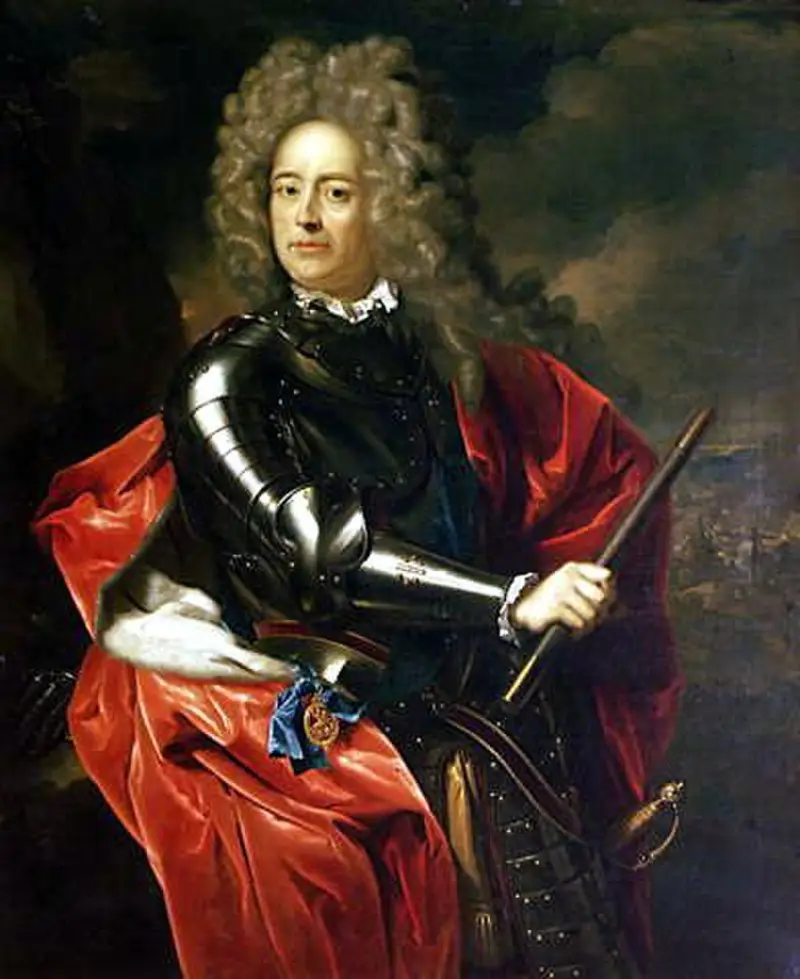
Adrian van der Werf. Portrait of John Churchill, Duke of Marlborough, 1704
В previous article we talked about the origins and early life of John Churchill, better known as the Duke of Marlborough, the beginning of his military career and his unexpected arrest on suspicion of treason. Today we will continue this story.
So, King William of Orange, who freed Churchill from the Tower, died in 1702. He was succeeded by his wife's younger sister, Anna Stewart, whose close friend, as we remember, was the wife of the hero of the article, Sarah. Within a month, John was promoted to the rank of Feldzeichmeister General, becoming second in seniority after Prince Consort George of Denmark and Norway, Duke of Cumberland, who was Generalissimo and Supreme Commander. In addition, the Queen awarded Marlborough the Order of the Garter.
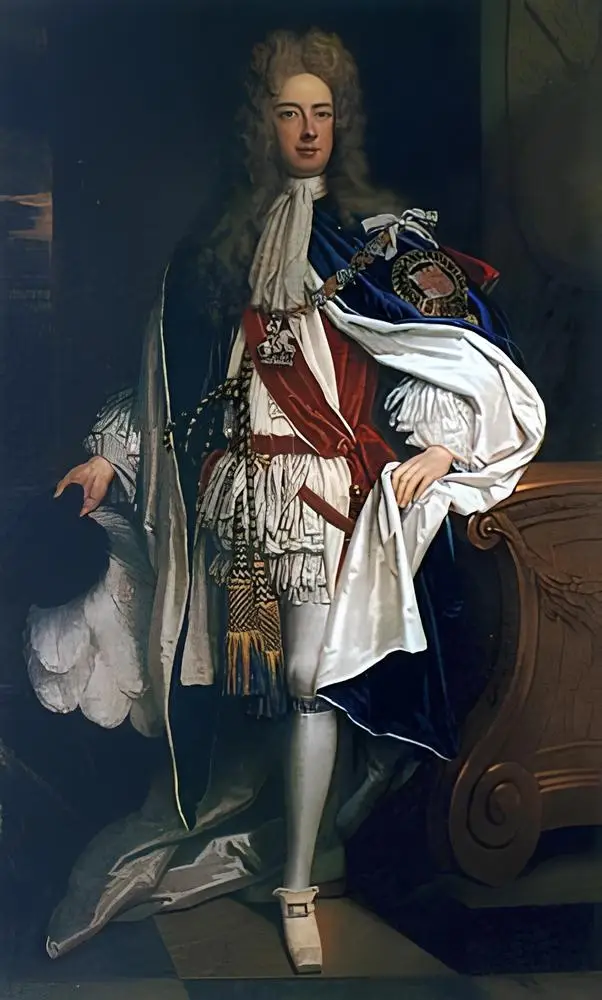
Gottfried Kneller. The Duke of Marlborough wearing the robes of a Knight of the Order of the Garter
War of the Spanish Succession
Meanwhile, on November 1, 1700, without leaving a direct heir, the Spanish King Charles II died. And even earlier, in 1699, the son of the Bavarian Elector Joseph Ferdinand, whom this king appointed as his heir, died. Now two relatives of Charles II laid claim to the vacant Spanish throne. The first was his nephew - the Austrian Archduke Charles, who ultimately would not receive the Spanish throne, but would become Emperor Charles VI. The second is the great-nephew of Charles II, Philip of Anjou, grandson of Louis XIV and uncle of Louis XV, who will become the Spanish king and founder of the Spanish line of the Bourbon dynasty.
Louis XIV supported his relative Philip, which caused great concern in Europe - France, which was already pursuing a very aggressive foreign policy, was becoming too strong. And therefore, on March 7, 1701, in The Hague, representatives of the Holy Roman Empire of the German nation, England and the United Provinces of the Netherlands, having signed an alliance treaty, declared war on the France of Louis XIV - this was the famous War of the Spanish Succession. Let us note, by the way, that in parallel with it another great war took place in Europe - the Northern War (1700-1721), which began for Russia with a defeat at Narva, and ended with the conclusion of the beneficial Nystadt Peace Treaty.
But let's return to the War of the Spanish Succession. The army of the Holy Roman Empire was led by the already well-known commander Eugene of Savoy in Europe, whom Alexander Suvorov tried to imitate in childhood: the fact is that both of these commanders were not distinguished by heroic stature, they were often sick in childhood and no one expected feats from them. The military career of Eugene Savoysky began under the walls of Vienna besieged by the Turks in 1683. And already in 1697, he defeated the Ottoman army near the city of Zenta: the Turks lost about 25 thousand people, the Grand Vizier Mehmed Almas died in the battle, Sultan Mustafa II abandoned his harem and fled to Temesvar. Louis XIV, who was an ally of the Ottomans in that war (of the League of Augsburg), having learned about this victory of Eugene of Savoy, entered into negotiations with the Habsburgs, and France withdrew from the war: on October 30, 1697, a peace treaty was signed in Ryswick. And on January 26, 1699, the Ottomans were forced to agree to peace: according to the Treaty of Karlovac, they ceded Hungary, part of Slavonia and Transylvania to the Habsburgs, with the exception of Temesvar.
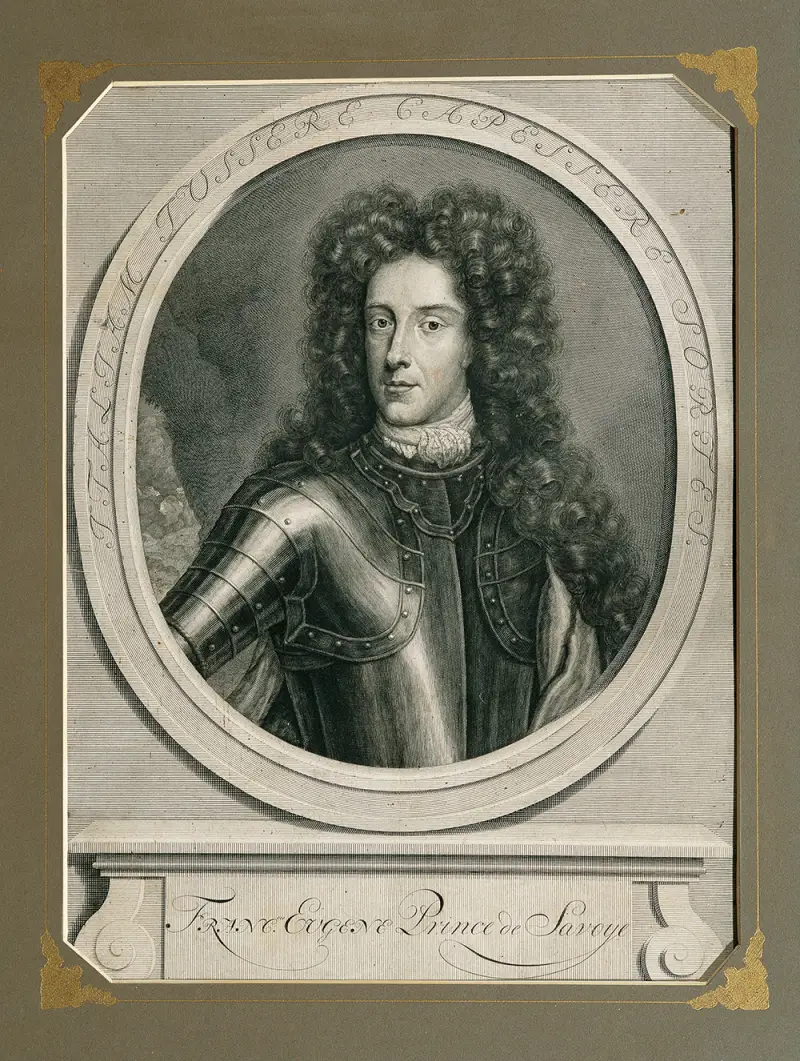
Unknown artist. Portrait of Eugene Savoysky, 1700
And the united army of the “sea powers” was led by John Churchill.
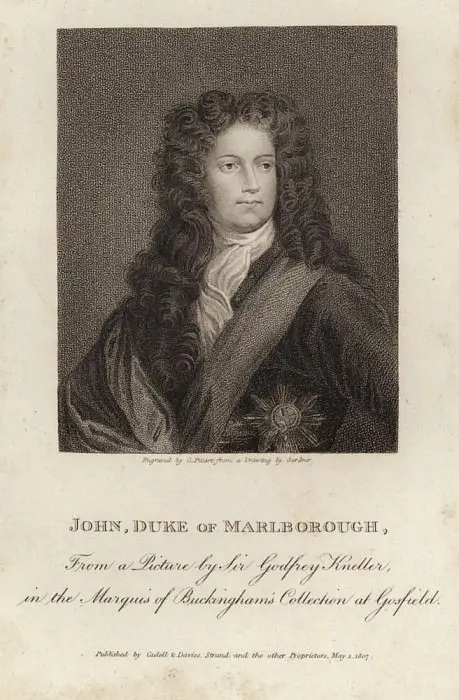
John Churchill, Duke of Marlborough engraved by Godfrey Kneller
These two commanders united their armies several times, with Eugene of Savoy invariably agreeing to give overall leadership of operations to Churchill - a rare case in stories, when one great commander without dispute recognizes the primacy of another.
Churchill's nephew James FitzJames, the first Duke of Berwick - the son of his sister Arabella and the former King James II (at the time of his birth - still Duke of York), also took part in this war, but in the army of Louis XIV. Even before his father’s expulsion, he fought in the army of the Holy Roman Empire against Turkey, participated in the siege of Buda and the Battle of Mohács. In 1689, he traveled with his father to Ireland and was seriously wounded at the Battle of the Boyne. He fought on the side of France in the Nine Years' War (War of the League of Augsburg), rising to the rank of lieutenant general. During the War of the Spanish Succession, he became Marshal of France and received the title of Duke de Fitz-James from Louis XIV; in Spain he became Duke of Lyrica and Gerica.
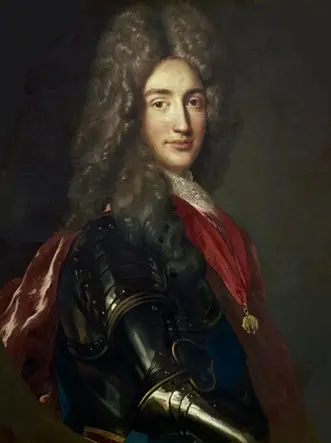
James FitzStuart, Duke of Berwick in a portrait by an unknown artist
Military historians believe that it was he and Marshal Vendôme who prevented the capture of Spain by the allied forces and preserved the throne for Philip V of Bourbon.
A curious incident occurred in 1707 at the Battle of Almansa: the Englishman James Fitzjames was at the head of the Spanish and French troops, and the Portuguese, English and Austrian troops were commanded by the French Huguenot Henri de Massu, Earl of Galway. The nephew of the Duke of Marlborough completely defeated his opponents. He died in June 1734 during another war - during the siege of the city of Philipsburg (which eventually surrendered to the French).
But let's go back to the very beginning of the 1701th century. In 9, in Northern Italy, the imperial army of Eugene of Savoy won victories at Carpi (July 1) and Oglio (September 15), but was defeated at Luzzara on August 1703 of the following year. In January 1703, Eugene of Savoy handed over command to Guido Staremberg and returned to Vienna, where he became chairman of the Hofkriegsrat. And John Churchill fought in the Spanish Netherlands (the territory of modern Belgium), capturing Venlo, Roermond and Liege. In May 1703, he captured Bonn; in August 6, the 1702-strong garrison of the Guyuy fortress capitulated to his troops. Churchill proposed very interesting and promising plans for invading French territory, but his initiatives did not find understanding among the Parliament of the Netherlands and the “Grand Pensionary” Anthony Heinsius. The Dutch generally did not like to fight far from home, suspecting that the British might sacrifice their state for their own interests. But it was after the campaigns of 1703-XNUMX. John Churchill received the title Duke of Marlborough.
The first joint battle of John Churchill Marlborough and Eugene of Savoy
In May 1704, Churchill's army of 16 made an impressive march from Maastricht to the Danube. In three weeks, his soldiers covered 550 km; only 900 of them fell ill or fell behind for some other reason. The army of Eugene of Savoy was moving towards him from Northern Italy. In August 1704, the allies united in Bavaria near Hochstedt (Blenheim). Less than a year ago, the French Marshal Villars and the Bavarian Elector Maximilian II defeated the troops of the Holy Roman Empire here. Now the Franco-Bavarian troops, led by Maximilian II and the French marshals Tallard and Marcin, suffered a complete defeat, losing up to 38 thousand soldiers and officers killed, wounded and captured. According to various sources, from 11 thousand to 14 thousand soldiers and officers were captured, among them was Marshal Tallar. Allied trophies included 150 artillery pieces. The total losses of Marlborough and Eugene of Savoy were about 5000 killed and up to 8000 wounded. The blow of the English cavalry turned out to be decisive, and Churchill took personal part in this attack, leading 5 squadrons.
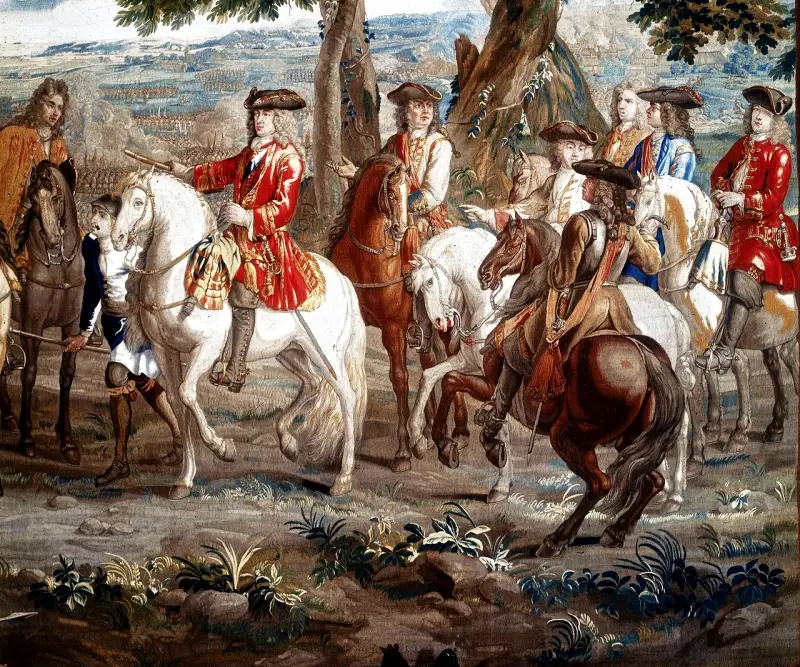
The Duke of Marlborough at the Battle of Blenheim, scene from the Blenheim Palace tapestry
Emperor Leopold I of Habsburg awarded Churchill the title of Count with the estate of Mindelheim, and the English Parliament gave him the manor of Woodstock and a million pounds sterling. By the way, Marlborough named his English estate Blenheim, which speaks volumes about the importance he attached to this victory. It was at Blenheim Palace that British Prime Minister Winston Churchill was born in 1874.
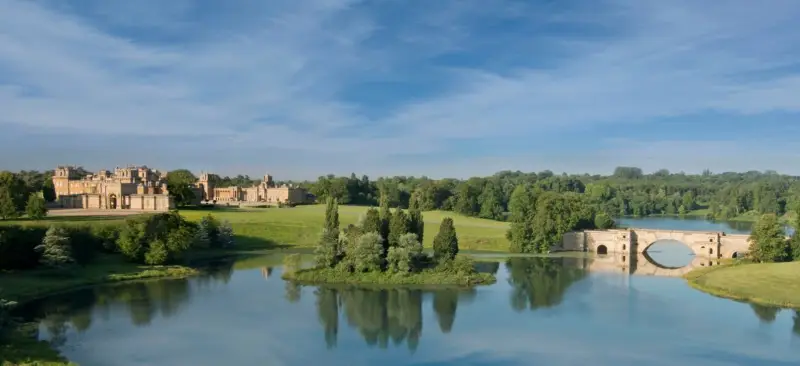
Blenheim
Continuation of the War of the Spanish Succession
In 1705, Eugene of Savoy operated very successfully in Northern Italy, where, in alliance with Victor Amedee of Savoy, he defeated the army of the Duke of Orleans besieging Turin, captured Milan and a number of territories in Savoy and Piedmont. But John Churchill suffered several defeats in battles with the army of Marshal Villar. However, on July 18, at the Battle of Elixem, he managed to break through the so-called Brabant Lines - a 70-mile strip of defensive field fortifications that ran in an arc from Namur to Antwerp. Marlborough then took personal part in a cavalry battle against French cavalry units. And on May 23, 1706, the Duke won a great victory in the battle of Ramilla - one of the most significant in that difficult war. He was opposed by the united troops of France, Spain and Bavaria, commanded by Marshal Villeroy, a childhood friend of Louis XIV. First, Marlborough attacked the enemy's left flank, forcing the enemy commander to transfer all reserves there. And then he hit the right flank, on which the Dutch cavalrymen broke through the front. The French and Bavarians fled, leaving the winners with 80 banners, 54 guns and almost the entire convoy. The French troops retreated, abandoning such important cities as Leuven, Brussels, Antwerp, Bruges and Ghent. However, the victory was not easy: the French cavalrymen who broke through cut down part of Marlborough's retinue, and a horse under the duke was killed.
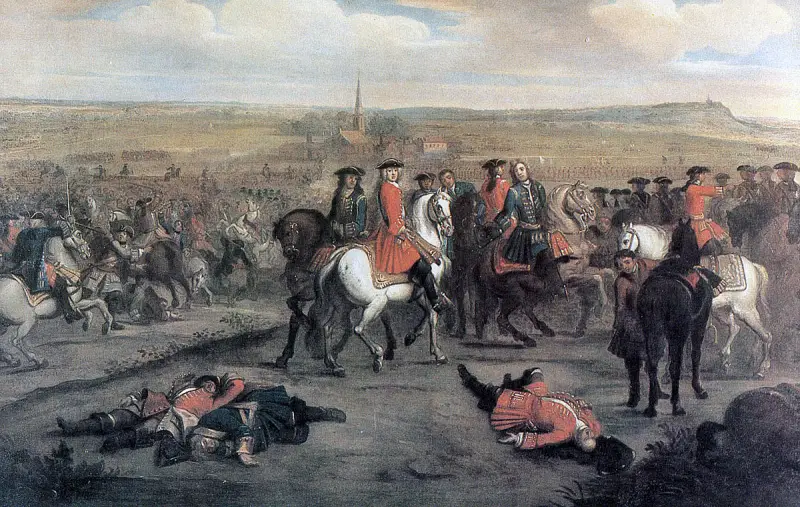
Louis Lager. The Duke of Marlborough and his staff at the Battle of Ramillies on 12 May 1706. In the right foreground is the murdered Colonel Brinfield.
Churchill was offered to become Stadtholder of Belgium, but this caused discontent in the Dutch parliament, and the Duke was forced to refuse.
And Louis XIV, already at the end of 1706, began to think about peace and possible concessions. In 1708, he had already made an official proposal to sign a peace treaty and was ready to cede Spain. However, the Whigs, who had a majority in the English Parliament (who were supported by John Churchill), set obviously unacceptable conditions, which included the separation of its own territories from France, and the war continued.
New joint victories of John Churchill and Eugene Savoysky
Meanwhile, in the spring of 1708, Eugene of Savoy arrived in the Netherlands. He again teamed up with Churchill, and on July 11, at the Battle of Oudenaarde (near Ghent) on the Scheldt River, the allies defeated the army of Louis-Joseph de Bourbon-Vendôme and Duke Louis of Burgundy, the grandson of the French king. In this battle, under the leadership of Marlborough, the Hanoverian prince took part, who would later ascend the throne under the name George II. The victory was not easy, at some point only the inconsistency of the actions of the enemy commanders did not allow the French to collapse the weak right flank of the allied forces. Eyewitnesses convey the words of Vendôme, which he said to Prince Louis after the battle:
The situation was saved by Churchill’s timely flank maneuver, which made it possible to encircle the right wing of the French army. As a result, Allied losses were three times less than those of the French.
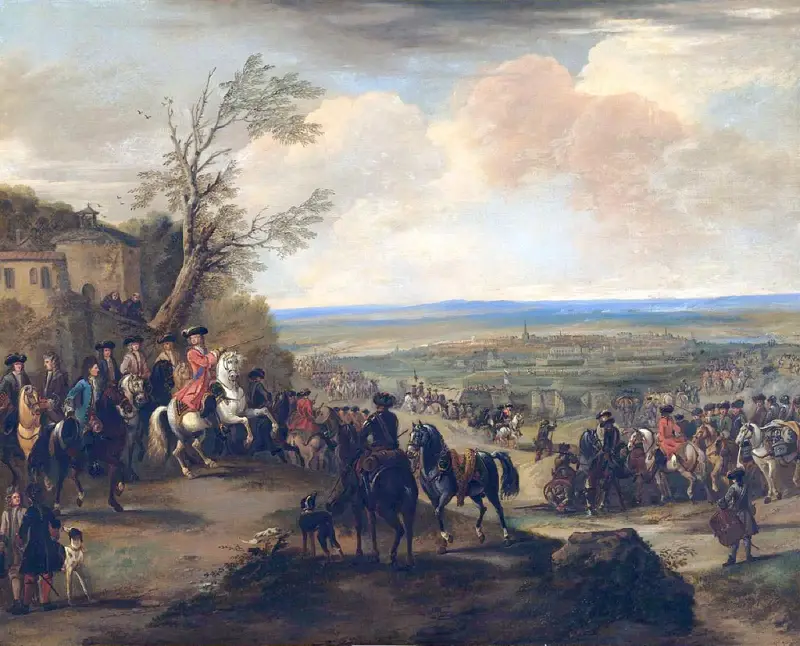
J. Wootton. John Churchill Duke of Marlborough on the battlefield of Oudenaarde
After this battle, Eugene of Savoy besieged Lille (which eventually capitulated), and Marlborough tried unsuccessfully to prevent the troops of his nephew Berwick from linking up with Vendôme's defeated army.
It seemed that victory was close; in 1709, Louis XIV had the last army left, which he entrusted to Marshal Claude Louis Hector de Villars, forbidding him to engage in a general battle.
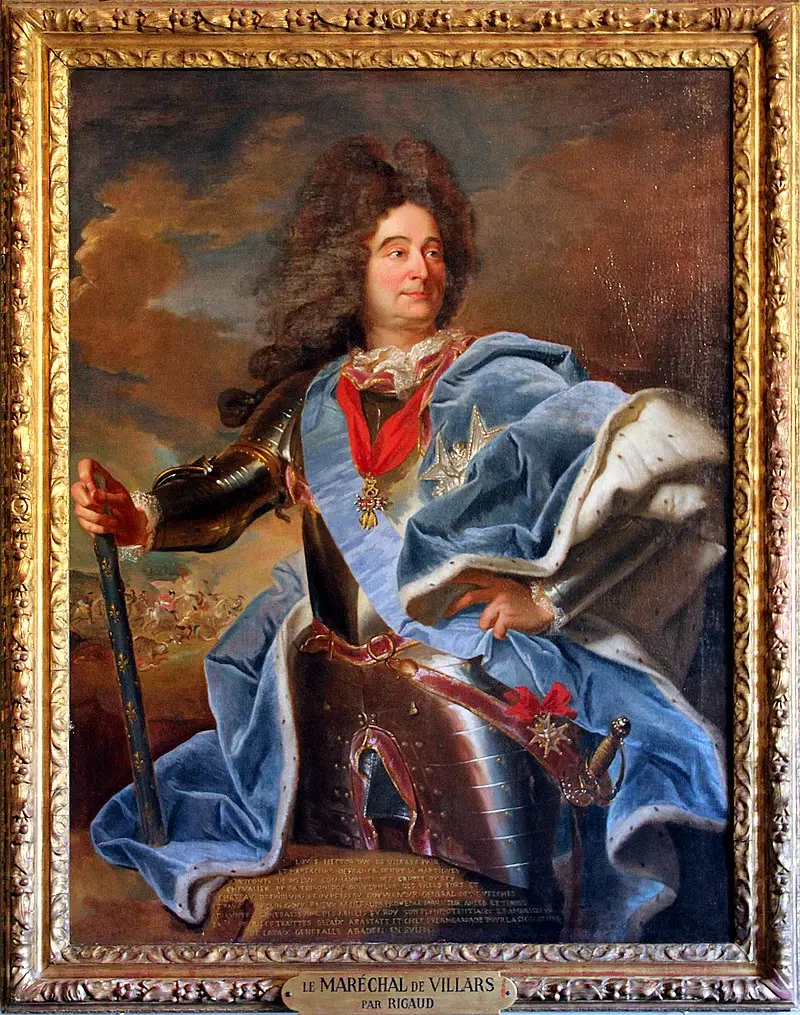
Claude-Louis-Hector de Villars in a portrait by Hyacinthe Rigaud, 1704
Meanwhile, John Churchill and Eugene of Savoy, having captured Lille and Tournai, led their troops to the last great French fortress - Mons. Here, near the village of Malplaquet, Villars was waiting for them, who decided to wear out the enemy troops in a defensive battle in a previously fortified position and inflict on them the maximum possible losses.
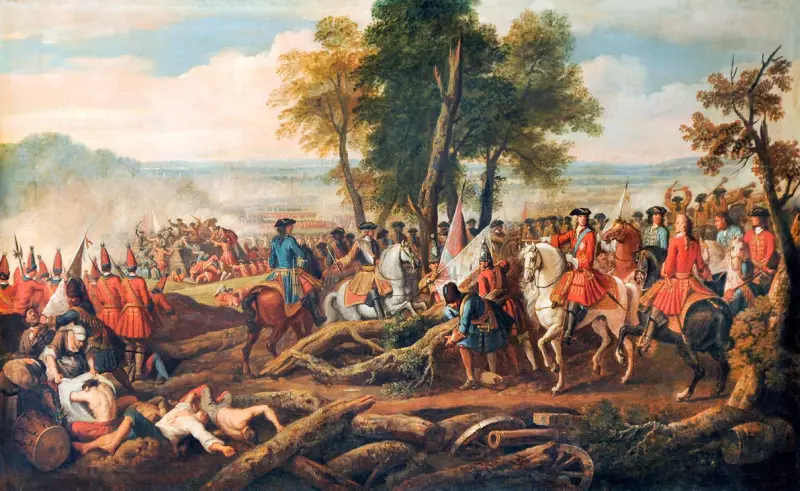
Louis Lager. Eugene of Savoy and the Duke of Marlborough inspect the French fortifications at Malplaquet
Villar called the built defensive line Non plus ultra - “the limit of the possible.” They said that he did this to spite Marlborough, who had recently received a rich doublet, and the tailor, handing it to the Duke, said this phrase - hinting that it was impossible to sew it better.
In the army of Eugene of Savoy, the 13-year-old illegitimate son of Augustus II the Strong (Elector of Saxony and King of the Polish-Lithuanian Commonwealth) ended up in the army - not yet recognized by his father. This boy will become a famous commander, chief marshal of France, and will remain in history under the name Moritz of Saxony.
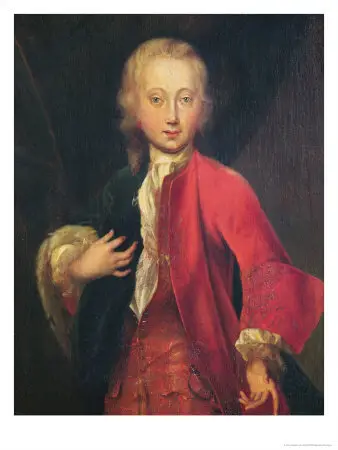
Already recognized by his father, 15-year-old Moritz, Count of Saxony in a portrait of 1711
Contemporaries would call Moritz "winner of the British, Germans and women's hearts" In 1725, he tried to marry the widow of Courland Duchess Anna Ioannovna, the future empress, but was expelled from Mitava by order of Menshikov. And he will refuse to marry another future empress - Grand Duchess Elizabeth Petrovna.
The numerical advantage was on the side of the Allies: 95 thousand French against 110 thousand soldiers of Marlborough and Eugene of Savoy.
Rumors suddenly spread in the French army about the death of Marlborough (people want at least some pleasant News), and someone composed the famous song “Marlbrough s'en va-t-en guerre” (“Marlbrough is ready to go on a hike”). It told about the sudden death of this commander, which his wife did not want to believe. Napoleon Bonaparte was very fond of humming this song, and, ironically, in 1812 in Russia they began to identify him with this same Malbrook who did not return from the campaign. Moreover, some Russian versions of this song were completely indecent in nature - not only the enemy commander, but also his unfortunate wife were dirtyly insulted.
A similar story happened, by the way, on the set of the film “The Hussar Ballad”, in which Napoleon’s campaign in Russia is for some reason illustrated by a song about King Henry (Henri) IV.
On September 11, 1709, a bloody battle began, in which John Churchill and Eugene of Savoy managed to push back the French and still take Mons in October, but the losses in their troops were such that the wounded Villars wrote to his king:
And Marlborough wrote in one of his private letters:
The losses of the parties amounted to up to 30 thousand people among the allies and about 12 thousand among the French (who also left 19 guns). In December of the same year, after a four-month siege, Lille was taken by storm. But in general, the victory of Marlborough and Eugene of Savoy was fruitless - the invasion of France was thwarted.
John Churchill's resignation
In 1710, the allies no longer had any special successes; Bruges and Ghent were captured only in January. And in the summer the border French fortresses of Bethune and Douai fell. But signs of exhaustion on both sides were growing. And in London they began to fear the revival of the empire of Charles V of Habsburg, whose state included both Austrian and Spanish lands. Anti-war pamphlets, also directed against Marlborough, were published in the English press; even the well-known Jonathan Swift was among the authors. In them, the recently extolled Churchill was already called a “butcher” and accused of deliberately prolonging the war, hoping to profit from supplies. And at the court of Anne Stewart, Sarah Marlborough’s cousin, Abigail Hill (married Mesham), appeared, who soon pushed the former favorite into the background. The comedy play “A Glass of Water: or Effects and Causes,” written by the French playwright Eugene Scribe in 1840, is dedicated to these intrigues.
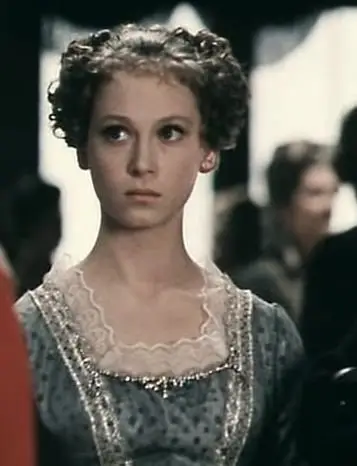
S. Kryuchkova as Abigail Hill, still from a Soviet film from 1979
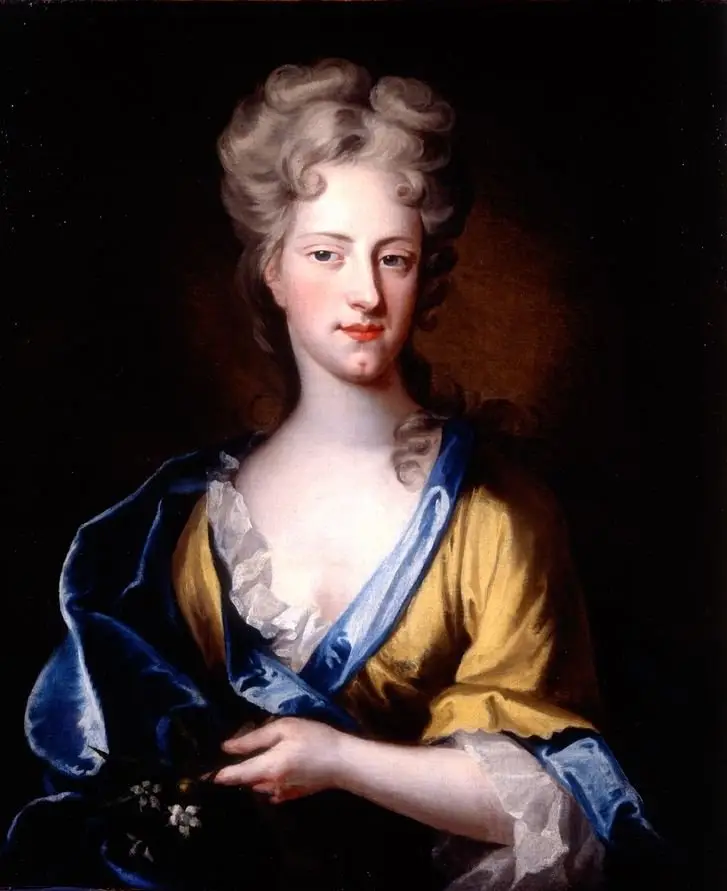
Gottfried Kneller. Supposed portrait of Abigail Hill, 1710
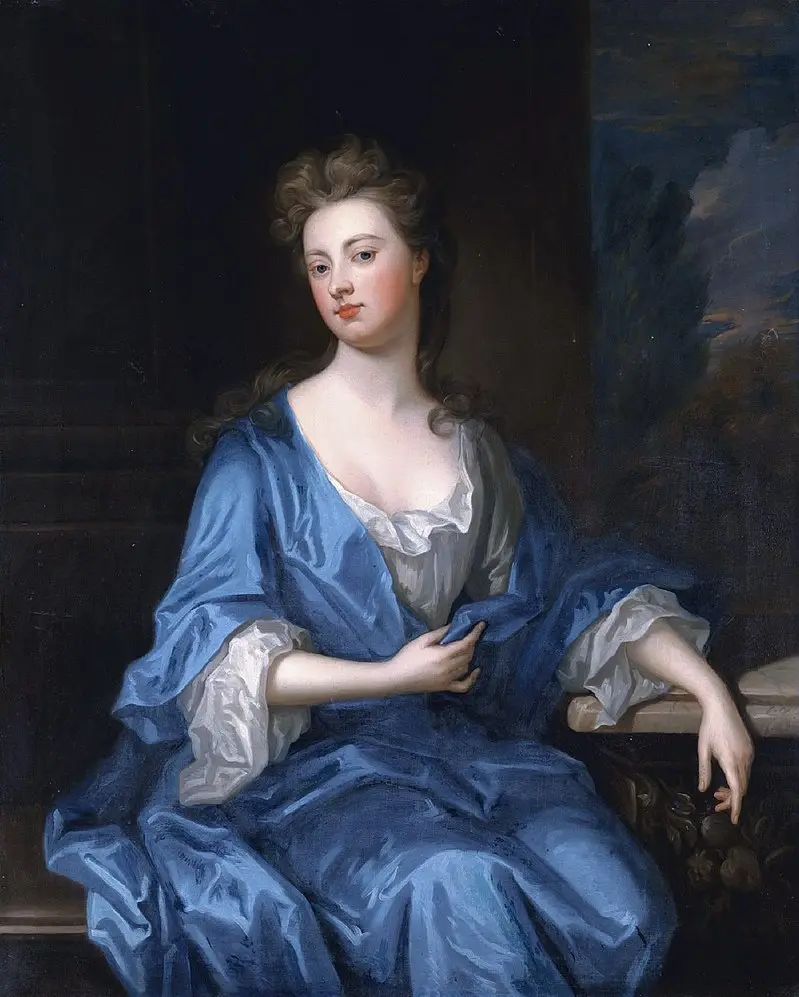
Sarah Jennings (Duchess of Marlborough) in a portrait by Gottfried Kneller, 1710
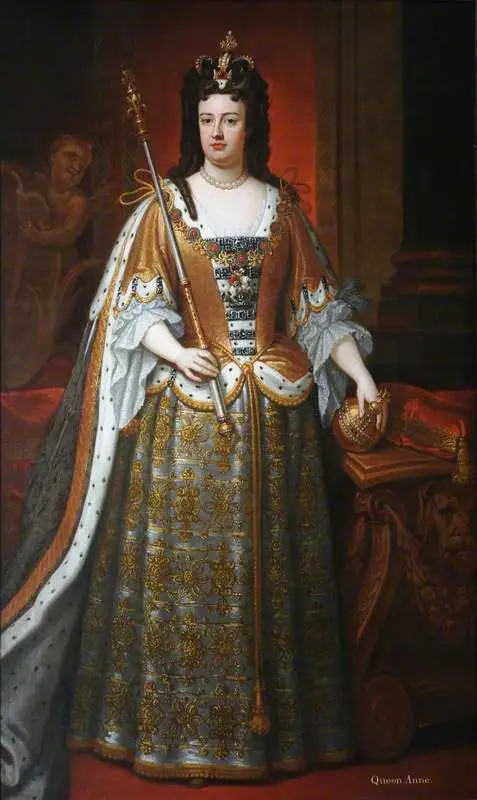
Queen Anne in a portrait by Gottfried Kneller, 1705
On January 1, 1712, John Churchill was removed from the post of commander of the British troops in the Netherlands, removed from all posts, accused of embezzlement of public funds and sentenced to pay a huge fine, for which he had to annually transfer 15 thousand pounds sterling to the treasury. On October 8, 1711, peace negotiations began; on August 5, 1712, Eugene of Savoy arrived in London, who was supposed to try to persuade the British to continue the war. He settled in the house of his friend and ally and actively supported the disgraced commander. He failed to persuade the British: on April 11, 1713, Great Britain (this state had already appeared on the political map of Europe - in 1707), Holland, Portugal, Prussia and Savoy signed a peace treaty with France in Utrecht. And the Holy Roman Empire continued to fight until 1714, and Eugene of Savoy fought on the Upper Rhine and in the Netherlands. But on March 6, 1714, a peace treaty was signed in Rastatt between these states, but only in 1725 did Emperor Charles VI (an unsuccessful contender for the Spanish throne) officially recognize Philip V as the king of Spain.
As for John Churchill, back in 1712 he left England and settled in the Netherlands. According to the Treaty of Utrecht, he lost the Principality of Mindelheim, which, after the victory at Blenheim, was given to him by Leopold I of Habsburg. He returned to England after the death of Queen Anne in 1714.
What were the results of the War of the Spanish Succession? Philip of Anjou nevertheless became the king of Spain, but was forced to renounce both for himself and for his descendants the right to inherit the French throne. Spain retained its overseas possessions, but lost the Netherlands, Naples, Milan, Sardinia, which went to Austria, which also established itself in Mantua. Savoy received Sicily, Montferrat and the western part of the Duchy of Milan, and Upper Geldern went to Prussia. Great Britain received the island of Minorca and the strategically important Gibraltar, which it still holds. In addition, the British achieved the right to monopoly trade in slaves in the Spanish colonies of America.
The last years of the life of the Duke of Marlborough
In 1714, after the death of Queen Anne, the Stuart dynasty came to an end. The new king was George I, the great-grandson of King James I and the great-great-grandson of the famous Mary Stuart, but a representative of the new Hanoverian dynasty. He once fought under Marlborough and has now restored him to rank and title, but the Duke was already seriously ill and therefore did not take an active part in the political life of the country. And in 1716, John Churchill suffered a severe stroke, after which he became disabled and was bedridden for the next 6 years until his death on June 16, 1722. His wife survived him by 20 years. The title of Duke of Marlborough passed to the grandson of one of the couple's daughters. The descendants of the Duke of Marlborough were the famous Prime Minister Winston Churchill (who wrote the book “Marlborough, His Life and Times”) and the “English Cinderella” Diana, whose family also included the illegitimate sons of Charles II and the illegitimate daughter of James II, and she herself had the title “ Lady", intended for the daughters of high peers.
Information